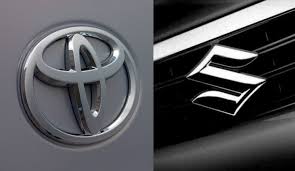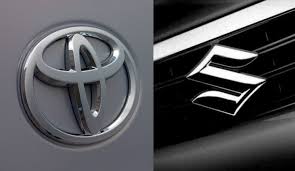
Sources in the Japanese car industry have confirmed that agreement on a comprehensive partnership covering areas such as development and procurement is very near between Toyota Motor and Suzuki Motor, Nikkei reported.
While specific points of cooperation would be spelled out later, sources reportedly said that the two Japanese automakers could announce a deal as soon as Monday. In addition to advancements needed to keep up with increasingly strong global environmental standards, self-driving technology and applications for information technology are expected to be included on the development side. The sharing sources for parts in Japan and abroad could be part of the partnering clause on procurement between the two companies could be involved.
In order to maintain its influence as nontraditional players such as tech companies stoke competition in the auto sector, Toyota has deemed it necessary to bolster cooperation with other automakers. And since dissolving a capital and business tie-up with Germany's Volkswagen in 2015, Suzuki has also sought a powerful partner. And with regards to cooperation therefore, Shoichiro Toyoda, Toyota's honorary chairman was approached by Suzuki Chairman Osamu Suzuki last year.
In order to avoid falling foul of antitrust law, selling of automobiles under their separate brands would be continued by Suzuki and Toyota unit Daihatsu Motor, which together control more than 60% of Japan's market for minivehicles known as kei cars. But, starting with a loose partnership on matters such as technological development, the two will collaborate in ways that steer clear of that risk. To deepen ties between the groups in the future, a capital tie-up, including cross-shareholdings, will be discussed.
In addition to Mazda Motor and Germany's BMW in recent times, capital and business partnerships with peers such as Subaru maker Fuji Heavy Industries and Isuzu Motors in the mid-2000s has been struck by Toyota and hence has been able to cast a wide net in the global auto sector. Shaping of industry standards for IT and self-driving technology to its advantage is allowed by these associations of Toyota. The number of autos Toyota and its allies will be able to make each year will be raised to at least 18 million by the Suzuki deal.
Promoting technology to integrate devices such as smartphones with vehicles, Toyota teamed with Ford Motor of the U.S. to launch the SmartDeviceLink Consortium in January. Additionally, signatory to the deal is Fuji Heavy, Mazda and Suzuki. Collaboration on automotive operating systems is also being explored by Toyota and its partners.
In the developing nations, the alliances are less developed. Suzuki’s soon-to-be partner has failed to make as much of a mark there as in countries such as Japan and the U.S. even though it commands a hefty share of the growing Indian auto market, for example. In the emerging markets, Daihatsu has been turned into a core unit for small cars after the unit became a full subsidiary of the group since 2016. The presence of the Japanese auto giant, Toyota, is expected to be boosted further with its deal with Suzuki on parts procurement and the production of certain models.
(Source:www.asia.nikkei.com)
While specific points of cooperation would be spelled out later, sources reportedly said that the two Japanese automakers could announce a deal as soon as Monday. In addition to advancements needed to keep up with increasingly strong global environmental standards, self-driving technology and applications for information technology are expected to be included on the development side. The sharing sources for parts in Japan and abroad could be part of the partnering clause on procurement between the two companies could be involved.
In order to maintain its influence as nontraditional players such as tech companies stoke competition in the auto sector, Toyota has deemed it necessary to bolster cooperation with other automakers. And since dissolving a capital and business tie-up with Germany's Volkswagen in 2015, Suzuki has also sought a powerful partner. And with regards to cooperation therefore, Shoichiro Toyoda, Toyota's honorary chairman was approached by Suzuki Chairman Osamu Suzuki last year.
In order to avoid falling foul of antitrust law, selling of automobiles under their separate brands would be continued by Suzuki and Toyota unit Daihatsu Motor, which together control more than 60% of Japan's market for minivehicles known as kei cars. But, starting with a loose partnership on matters such as technological development, the two will collaborate in ways that steer clear of that risk. To deepen ties between the groups in the future, a capital tie-up, including cross-shareholdings, will be discussed.
In addition to Mazda Motor and Germany's BMW in recent times, capital and business partnerships with peers such as Subaru maker Fuji Heavy Industries and Isuzu Motors in the mid-2000s has been struck by Toyota and hence has been able to cast a wide net in the global auto sector. Shaping of industry standards for IT and self-driving technology to its advantage is allowed by these associations of Toyota. The number of autos Toyota and its allies will be able to make each year will be raised to at least 18 million by the Suzuki deal.
Promoting technology to integrate devices such as smartphones with vehicles, Toyota teamed with Ford Motor of the U.S. to launch the SmartDeviceLink Consortium in January. Additionally, signatory to the deal is Fuji Heavy, Mazda and Suzuki. Collaboration on automotive operating systems is also being explored by Toyota and its partners.
In the developing nations, the alliances are less developed. Suzuki’s soon-to-be partner has failed to make as much of a mark there as in countries such as Japan and the U.S. even though it commands a hefty share of the growing Indian auto market, for example. In the emerging markets, Daihatsu has been turned into a core unit for small cars after the unit became a full subsidiary of the group since 2016. The presence of the Japanese auto giant, Toyota, is expected to be boosted further with its deal with Suzuki on parts procurement and the production of certain models.
(Source:www.asia.nikkei.com)














